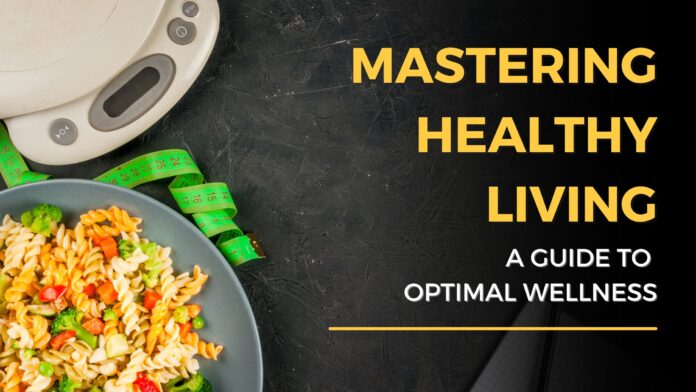Last Updated on October 5, 2023 by Shane Corbitt
Introduction to Healthy Living
Definition of healthy living
When we speak of healthy living, we refer to a holistic approach to life that encompasses both physical and mental well-being. It involves making conscious choices and adopting habits that promote optimal health.
Healthy living is not merely the absence of illness; it is about actively pursuing a lifestyle that nurtures our body, mind, and soul. It is a proactive commitment to self-care, balance, and personal growth.
Importance of adopting a healthy lifestyle
Adopting a healthy lifestyle is crucial for multiple reasons. Firstly, it serves as a preventive measure against chronic diseases such as obesity, heart disease, diabetes, and certain types of cancer.
By prioritizing physical activity and nourishing our bodies with wholesome foods, we fortify our immune system and enhance our overall resilience. Secondly, embracing a healthy lifestyle directly impacts our mental health.
Engaging in regular exercise releases endorphins – the feel-good hormones – which alleviate stress and anxiety while boosting mood and cognitive functions. Additionally, maintaining nutritious eating habits ensures an adequate intake of essential nutrients required for optimal brain function.
Choosing to live healthily cultivates longevity by promoting longevity through increased energy levels and improved physical capabilities. It enables us to make the most out of every day by enhancing productivity and reducing fatigue.

Overview of the benefits of healthy living
The benefits derived from adopting a healthy lifestyle are truly remarkable. Physically speaking, it leads to increased vitality by boosting energy levels throughout the day while improving overall endurance in various activities or exercise routines.
Furthermore, individuals who prioritize their well-being often experience enhanced mental clarity and increased focus on tasks at hand. This enables them to tackle challenges more efficiently while maintaining an optimistic outlook on life.
In terms of emotional well-being, practicing healthy living has shown positive effects on stress reduction. By engaging in activities such as mindfulness and meditation, individuals can attain a sense of calm and inner peace, better equipping them to manage the pressures of daily life.
Healthy living fosters the development of strong social connections and relationships. By prioritizing self-care, individuals are more likely to engage in social activities and build meaningful connections with others.
This reduces feelings of loneliness and isolation and provides a support system that contributes to overall well-being. Healthy living encompasses a multifaceted approach to life that benefits both our physical and mental well-being.
By adopting this lifestyle, we can experience increased vitality, improved mental clarity, enhanced emotional stability, and stronger social connections. It is an investment in ourselves that reaps rewards beyond measure.
Physical Health
Importance of Regular Exercise
Regular exercise is undeniably crucial for maintaining optimal physical health. Engaging in physical activity helps to keep our bodies fit and toned and profoundly impacts various bodily functions.
Exercise enhances blood circulation, strengthens muscles, and improves overall endurance. By incorporating regular exercise into our daily routines, we can effectively prevent the onset of numerous diseases and health conditions.
Different Types of Exercises (Cardiovascular, Strength Training, Flexibility)
To attain the maximum benefits from exercise, it is essential to diversify our workout routine by incorporating different types of exercises. Cardiovascular exercises such as running, swimming, or cycling elevate heart rate and improve lung capacity.
These exercises promote weight management by burning calories and fat while enhancing cardiovascular health. Strength training exercises involve resistance training with weights or bodyweight-based activities like push-ups or squats.
These activities help build lean muscle mass, increase bone density, and improve joint stability. Flexibility exercises such as yoga or Pilates improve the range of motion, enhance posture, and reduce the risk of injuries by lengthening muscles and improving their elasticity.


Benefits of Exercise on Physical Health
Exercise offers a plethora of benefits that extend beyond just weight management. It positively impacts multiple facets of physical health:
1. Weight Management: Regular exercise plays a vital role in controlling body weight by burning calories and increasing metabolism. It helps maintain a healthy body mass index (BMI) within an ideal range.
2. Improved Cardiovascular Health: Engaging in aerobic activities strengthens the heart muscle, lowers blood pressure levels, reduces bad cholesterol (LDL), and increases good cholesterol (HDL). This combination significantly reduces the risk of cardiovascular diseases such as heart attacks or strokes.
3. Increased Energy Levels: Physical activity stimulates endorphin production, the “feel-good” hormones that boost energy levels and enhance overall mood. Regular exercise also improves sleep quality, leading to increased vitality throughout the day.
4. Enhanced Mental Health: Exercise is known to alleviate symptoms of anxiety and depression by releasing endorphins and reducing stress hormones like cortisol. It improves cognitive function and memory retention and fosters a positive mindset.
5. Disease Prevention: Regular exercise helps prevent a wide range of chronic diseases such as type 2 diabetes, certain types of cancer (like colon or breast cancer), osteoporosis, and metabolic syndrome.
Nutrition and Healthy Eating Habits
To complement the benefits gained through exercise, maintaining a well-balanced diet is equally paramount for achieving optimal physical health.
Understanding Macronutrients and Micronutrients
Macronutrients encompass carbohydrates, proteins, and fats – the primary sources of energy for our bodies. Carbohydrates provide immediate energy, while proteins support muscle growth and repair tissues. Fats are vital for hormone production and insulation.
On the other hand, micronutrients include vitamins (A, B complex, C, D) and minerals (calcium, iron), which are essential for various bodily functions. These micronutrients support immune function, bone health, vision maintenance, and red blood cell production – just to name a few.
Importance of a Balanced Diet and Portion Control
Adopting a balanced diet in proper proportions ensures that our bodies receive all necessary nutrients without excessive intake of any particular food group. Consuming adequate amounts of fruits, vegetables (rich in fiber), whole grains (providing sustained energy release), lean proteins like fish or poultry (for muscle development), and healthy fats from sources like avocados or nuts leads to optimal nutrition.
Portion control also plays a pivotal role in maintaining overall health. By being conscious of serving sizes and avoiding overindulgence, we can prevent weight gain, maintain healthy blood sugar levels, and reduce the risk of various health conditions associated with excessive calorie intake.
Incorporating fruits, vegetables, whole grains, and lean proteins into meals ensures a balanced plate that offers essential vitamins, minerals, fiber, and antioxidants. It is recommended to prioritize fresh produce and limit processed or sugary foods for optimal nutrition.
By actively incorporating regular exercise and embracing healthy eating habits into our lifestyles, we pave the way toward achieving and maintaining optimal physical health. The benefits garnered from these choices are invaluable – increased energy levels, disease prevention, improved cardiovascular function – and uplifting our overall quality of life.
Mental and Emotional Well-being
Stress Management Techniques: Finding Inner Balance
Life can often be a whirlwind of responsibilities, deadlines, and pressures. To maintain mental and emotional well-being, it is crucial to incorporate effective stress management techniques into our daily routines. One approach that has gained significant popularity is mindfulness and meditation practices.
Mindfulness involves being fully present in the moment and observing our thoughts and feelings without judgment. Focusing on the present rather than worrying about the past or future can reduce stress levels and cultivate a sense of inner peace.
Another valuable tool for stress management is meditation. This practice involves sitting quietly, focusing attention inward, and achieving a state of deep relaxation.
Regular meditation can enhance self-awareness, improve concentration, lower blood pressure, and reduce anxiety levels. A variety of guided meditation apps and online resources are available to help beginners get started.


Engaging in Hobbies or Activities that Bring Joy: Nurturing Your Passion
Our busy lives make it easy to neglect our personal interests due to time constraints or other obligations. However, engaging in hobbies or activities that bring us joy is essential for maintaining mental well-being.
These activities provide an outlet for creativity and self-expression while offering a much-needed break from daily stresses. Whether it’s painting, playing an instrument, gardening, cooking, or any other passion, devote time regularly to these activities.
Engaging in hobbies helps improve focus and fosters a sense of accomplishment and fulfillment. The act of pursuing something we love can boost self-confidence while relieving stress as we immerse ourselves in pleasant distractions.
Importance of Quality Sleep: The Foundation for Mental Resilience
Sleep acts as the body’s reset button—a vital process that enables physical repair as well as mental rejuvenation. Adequate and high-quality sleep plays a pivotal role in maintaining optimal mental and emotional well-being. When we consistently achieve restful sleep, our cognitive functions improve, memory becomes sharper, and our ability to handle stress increases.
Impacts of Lack of Sleep on Mental Health: The Price We Pay
Conversely, insufficient sleep or poor sleep quality can have detrimental effects on mental health. Research suggests that chronic lack of sleep is associated with an increased risk of anxiety disorders, depression, mood swings, and difficulty managing emotions. It impairs cognitive function, leading to reduced concentration, impaired decision-making abilities, and decreased productivity.
Tips for Improving Sleep Hygiene: Prioritizing Restful Nights
Practicing good sleep hygiene is essential to enhance the quality and duration of our sleep. Establishing a consistent bedtime routine helps signal the body that it’s time to wind down and prepare for rest. Prioritize creating a comfortable sleeping environment by ensuring your bedroom is dark, quiet, cool, and free from distractions like electronic devices.
Avoid stimulating activities or consuming caffeine close to bedtime as they interfere with falling asleep naturally. Instead, engage in relaxing activities such as reading a book or taking a warm bath before retiring to bed.
Regular exercise contributes to better sleep quality, but avoid vigorous workouts near bedtime as they may increase your energy levels instead. Incorporating mindfulness practices like deep breathing exercises or progressive muscle relaxation can help calm the mind before sleep.
If persistent difficulties with sleeping persist despite implementing these strategies or if you suspect an underlying medical condition affecting your sleep patterns—seek professional guidance from a healthcare provider specialized in sleep disorders. By prioritizing stress management techniques like mindfulness and meditation practices, along with embracing enjoyable hobbies while ensuring adequate rest through good sleep hygiene habits—we can cultivate strong mental resilience that allows us to navigate life’s challenges more effectively while maintaining our overall well-being.
Social Connections and Relationships
The Power of Human Connection: Building Strong Social Connections for a Healthier Life
In today’s fast-paced world, fostering strong social connections and maintaining meaningful relationships is often overlooked in the pursuit of career success and personal achievements. However, research consistently shows that having a robust social network plays a vital role in our overall well-being.
The benefits of maintaining strong social connections extend far beyond mere companionship; they profoundly impact our mental, emotional, and even physical health. One significant advantage of nurturing social connections is the reduction of feelings of loneliness and isolation.
Loneliness has become an epidemic in modern society, affecting people from all walks of life. Studies have shown that chronic loneliness can be as detrimental to our health as smoking 15 cigarettes a day.
We can combat these feelings of isolation by actively engaging with others, seeking companionship, and fostering meaningful relationships. Sharing experiences, thoughts, and emotions with like-minded individuals cultivates a sense of belongingness and boosts self-esteem.


Building Bridges: How Strong Social Connections Promote Overall Well-being
Beyond alleviating loneliness and isolation, maintaining strong social connections has been linked to several other aspects that contribute to overall well-being. One notable effect is the positive impact on mental health.
Meaningful relationships provide emotional support during challenging times, thus reducing stress levels and improving coping mechanisms. Having someone we trust to confide in creates a safe space where we can freely express ourselves without fear of judgment or rejection.
Furthermore, robust social networks positively influence physical health outcomes as well. Research indicates that individuals with strong social bonds tend to have lower rates of heart disease, high blood pressure, obesity, and even mortality rates compared to those who are socially isolated.
This correlation can be attributed partly to the encouragement received from friends or loved ones to adopt healthy behaviors such as regular exercise or nutritious eating habits. Additionally, when we are surrounded by a strong support system, we are more likely to seek medical attention promptly and adhere to preventive measures, leading to better overall health outcomes.
Building Meaningful Relationships: Tips for Social Engagement
While recognizing the importance of social connections is essential, actively participating in social activities is equally crucial. Here are some practical tips for building meaningful relationships and nurturing social engagement:
1. Actively Participate in Social Activities: Seek out opportunities to engage with others in activities that resonate with your interests and values. Join clubs, organizations, or community groups centered around hobbies or causes you are passionate about.
2. Communicate Effectively with Others: Develop effective communication skills by being an active listener, expressing empathy, and practicing open-mindedness. These qualities foster deeper connections with others and create an environment where individuals feel heard and understood.
Building strong social connections takes time and effort; it requires initiating conversations, maintaining regular contact, and being present for others during joyful moments and challenging times. The rewards of deepening these relationships are immeasurable—a sense of belongingness, emotional support, personal growth, and improved overall well-being.
Preventive Measures for Optimal Health
Importance of regular check-ups and screenings
Regular check-ups and screenings are essential components of maintaining optimal health. These preventative measures allow healthcare professionals to identify potential health issues before they escalate into more serious conditions.
By undergoing routine check-ups, individuals can detect and address any abnormalities or risk factors early on, increasing the chances of successful treatment and improved outcomes. Regular screenings help identify diseases or conditions that may not present obvious symptoms, such as high blood pressure or high cholesterol levels, allowing for prompt intervention.
Different types of screenings (blood pressure, cholesterol levels)
Regular screenings play a vital role in preventive healthcare. Two key screenings that are commonly performed include blood pressure measurement and cholesterol level testing. Blood pressure screening helps to identify hypertension, a condition that can lead to serious cardiovascular complications if left untreated.
It involves measuring systolic and diastolic pressures using a sphygmomanometer while considering various factors like age, gender, and family history. Cholesterol level testing is another crucial screening procedure used to evaluate the levels of low-density lipoprotein (LDL), high-density lipoprotein (HDL), and triglycerides in the blood.
High LDL cholesterol is associated with an increased risk of heart disease, while low HDL cholesterol may also indicate an elevated risk. By understanding these measurements through regular screenings, individuals can take appropriate measures to manage their cholesterol levels effectively.
Early detection and prevention strategies
Early detection plays a pivotal role in preventing serious health conditions from progressing further. Regular check-ups and timely screenings can identify potential issues at their initial stages when treatment options are often more effective. Moreover, early detection enables individuals to make necessary lifestyle adjustments or enact preventive measures specific to their condition.
Prevention strategies include adopting healthy habits such as maintaining a balanced diet, exercising regularly, managing stress, and avoiding harmful substances like tobacco and excessive alcohol consumption. These practices decrease the risk factors associated with various diseases, bolstering overall health and well-being.
Conclusion
Regular check-ups, screenings, immunizations, and early detection strategies are invaluable tools in maintaining optimal health. By taking proactive steps to prevent illnesses and identify potential health issues at their initial stages, individuals can lead healthier lives with reduced risks of complications.
Embracing these preventive measures empowers individuals to take charge of their well-being and make informed decisions about their health. Remember that prevention is more cost-effective than treatment and a powerful tool for achieving long-term vitality and enjoying life to the fullest.
Embark on a transformative journey where every step radiates vitality with our guide on How to Start Living a Healthy Lifestyle, offering practical tips for weaving wellness into every aspect of your day. Then, explore the profound depths of well-being by diving into Why Living a Healthy Lifestyle is Important, unraveling the secrets behind the profound impact of daily health choices on your longevity, happiness, and overall quality of life. Let’s cultivate a life where every moment is a vibrant one together!










